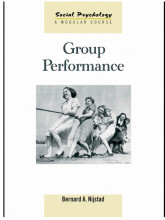Group idea generation and creativity - De Dreu, Nijstad & van Knippenberg (2008)
6 important questions on Group idea generation and creativity - De Dreu, Nijstad & van Knippenberg (2008)
What refers epistemic motivation to?
How is social motivation defined?
between oneself and other group members and can be proself (i.e., the individual is concerned with own outcomes only) or prosocial (i.e., the individual is concerned with joint outcomes and fairness).
What do De Dreu, Nijstad & van Knippenberg argue?
exchange and integration, and the quality of group judgment and negotiated agreement.
- Higher grades + faster learning
- Never study anything twice
- 100% sure, 100% understanding
What is group polarization?
What is the sufficiency principle?
When, in contrast, decision makers feel they already have the information they need to make a decision, epistemic needs are satisfied and there will be no additional search for and processing of new information.
What is group centerdness?
The question on the page originate from the summary of the following study material:
- A unique study and practice tool
- Never study anything twice again
- Get the grades you hope for
- 100% sure, 100% understanding
































